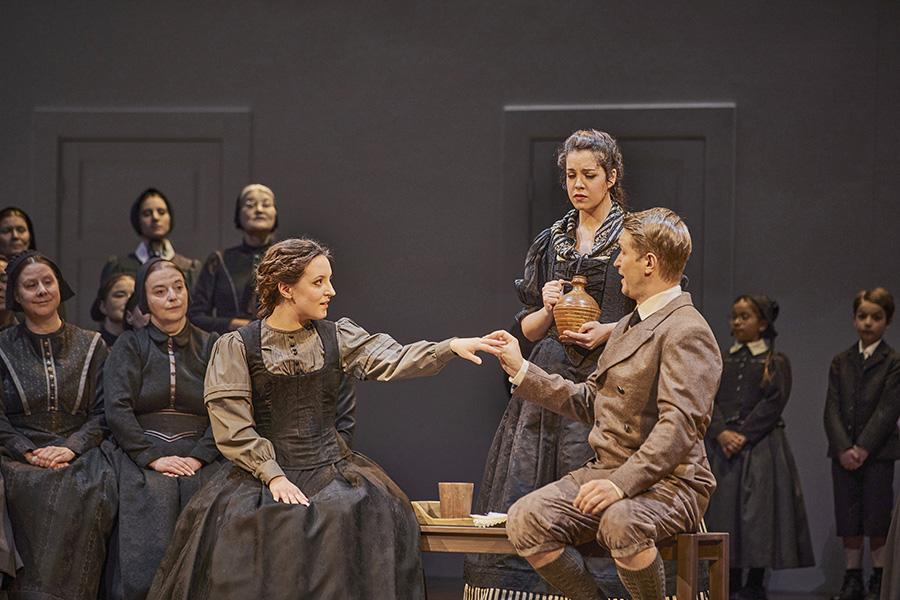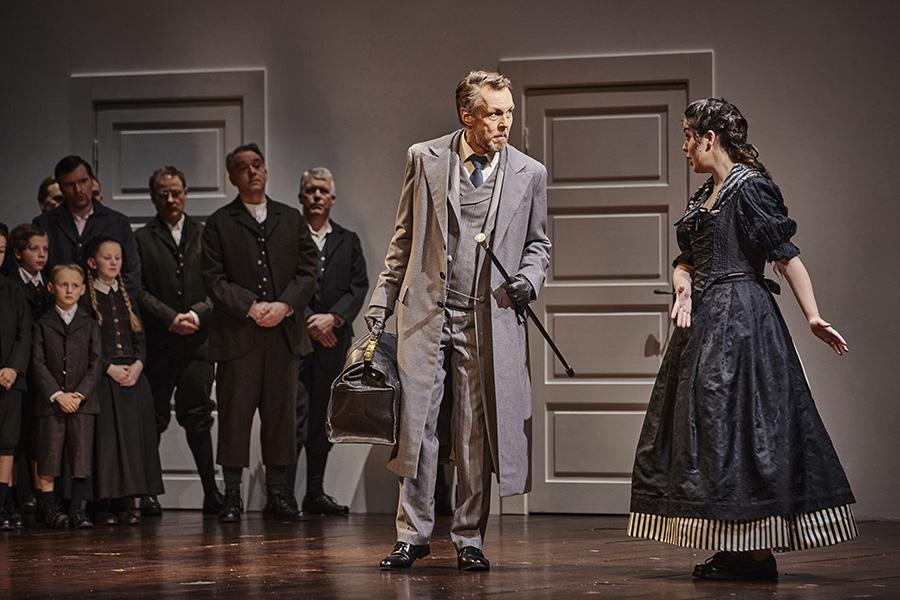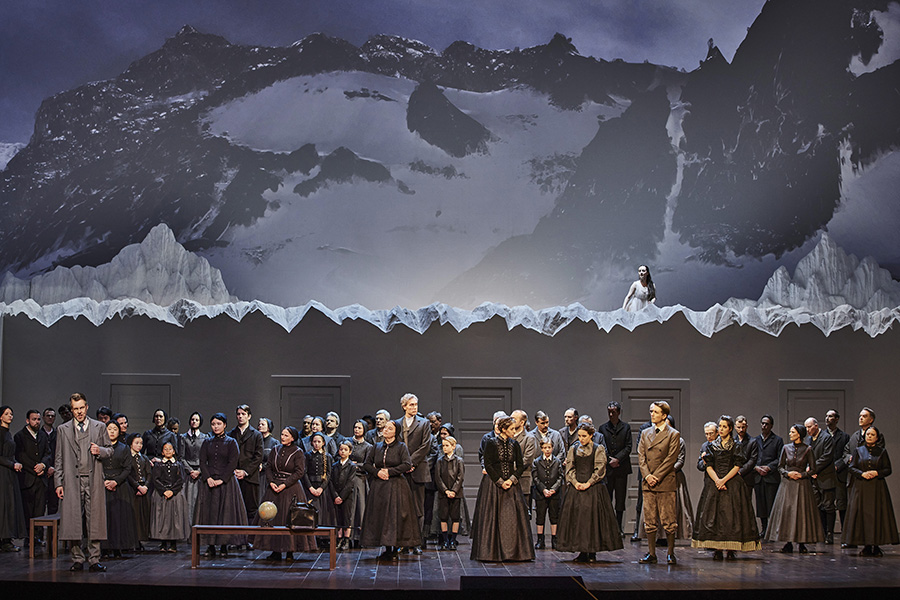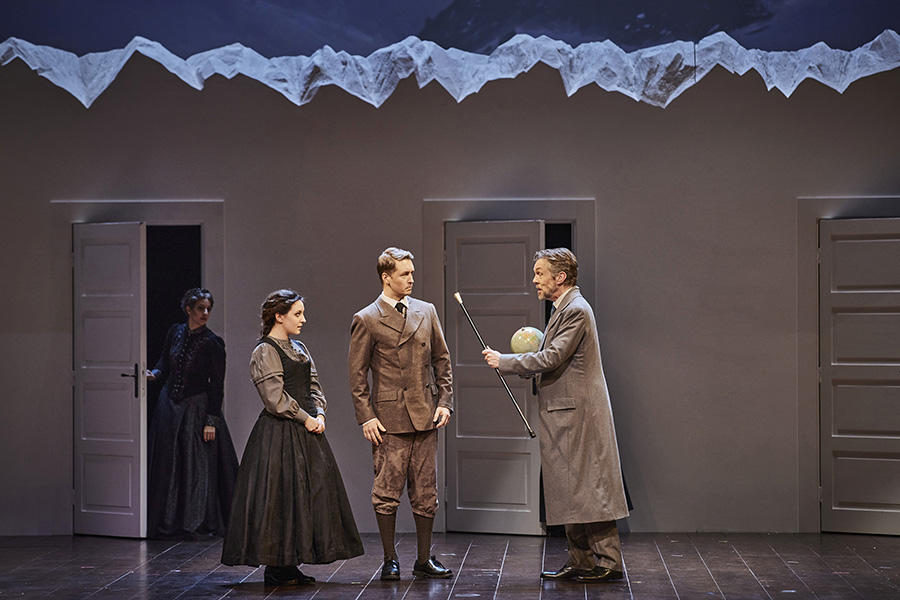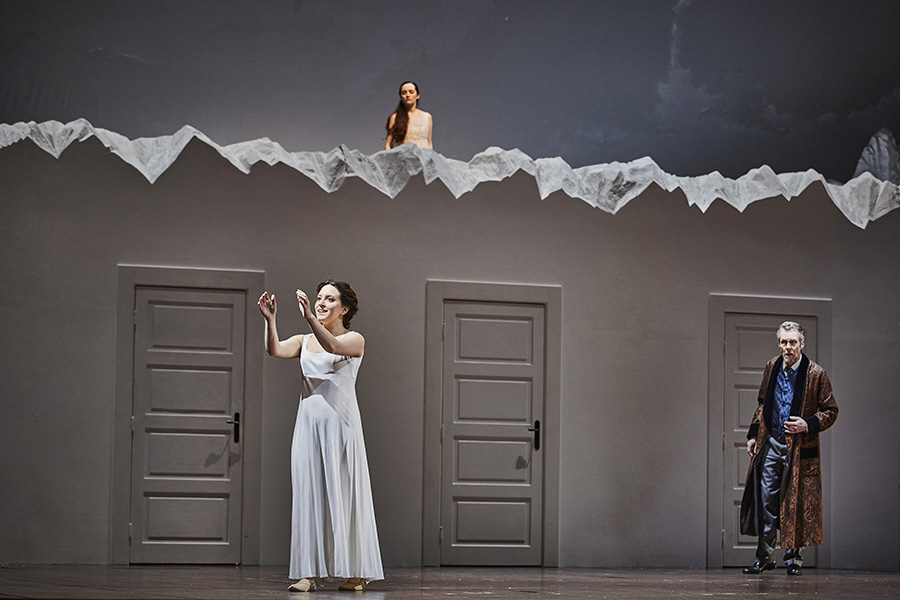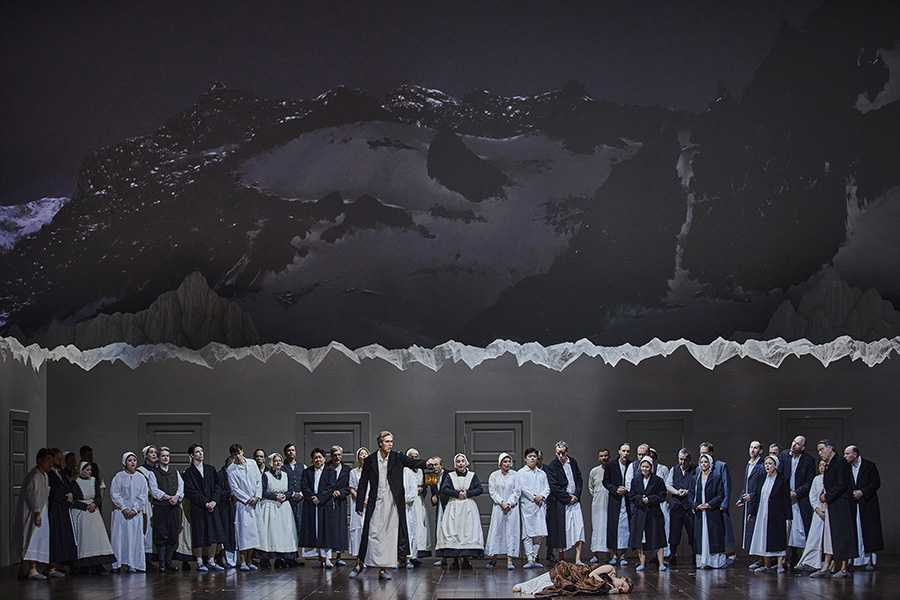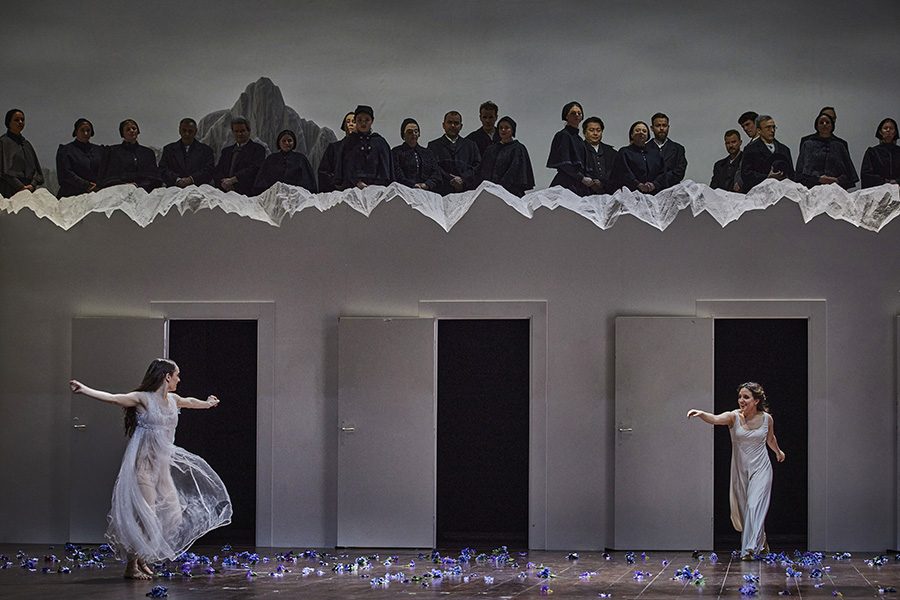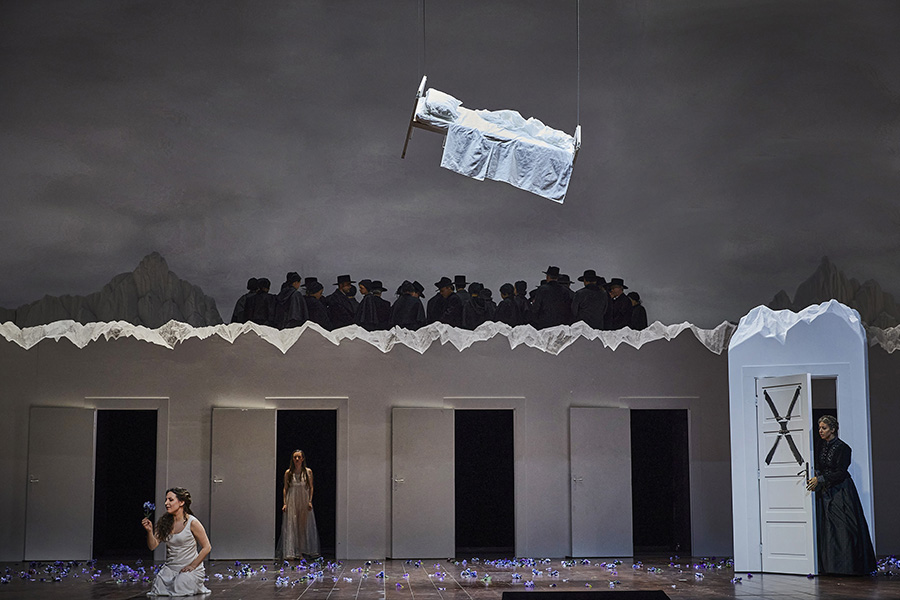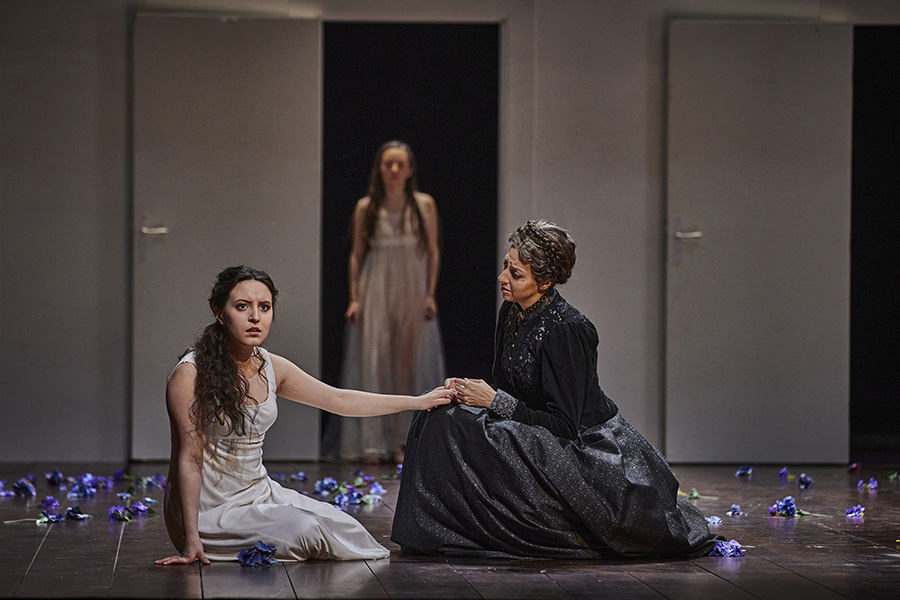Vincenzo Bellini’s opera »La sonnambula«, which premiered in Milan in 1831, is con-sidered his most important work alongside »Norma«, which was completed only six months later.
Melodramma in two acts
Libretto by Felice Romani
Performed in Italian with German and English surtitles
Premiere
19. March 2023
Dates & Cast
- Conductor Antonello Allemandi
- Staging Rolando Villazón
- Collaboration Regie Bettina Geyer
- Set Design Johannes Leiacker
- Costume Design Brigitte Reiffenstuel
- Lighting Design Davy Cunningham
- Choreography Philippe Giraudeau
- Choir Jonathan Becker
- Dramaturgy Juliane Schunke
- Conductor Antonello Allemandi
- Staging Rolando Villazón
- Collaboration Regie Bettina Geyer
- Set Design Johannes Leiacker
- Costume Design Brigitte Reiffenstuel
- Lighting Design Davy Cunningham
- Choreography Philippe Giraudeau
- Choir Jonathan Becker
- Dramaturgy Juliane Schunke
A co-production with the Théâtre des Champs-Élysées, the Metropolitan Opera, and the Opéra de Nice Côte d’Azur
Generously supported by the Semperoper Foundation
- Graf Rodolfo Bogdan Talos
- Teresa Reut Ventorero
- Amina Emily Pogorelc
- Elvino Maxim Mironov
- Lisa Ofeliya Pogosyan
- Alessio Martin-Jan Nijhof
- ein Notar Gerald Hupach
- Spirit Chiara Detscher
- Conductor Antonello Allemandi
- Staging Rolando Villazón
- Collaboration Regie Bettina Geyer
- Set Design Johannes Leiacker
- Costume Design Brigitte Reiffenstuel
- Lighting Design Davy Cunningham
- Choreography Philippe Giraudeau
- Choir Jonathan Becker
- Dramaturgy Juliane Schunke
A co-production with the Théâtre des Champs-Élysées, the Metropolitan Opera, and the Opéra de Nice Côte d’Azur
Generously supported by the Semperoper Foundation
- Graf Rodolfo Bogdan Talos
- Teresa Reut Ventorero
- Amina Emily Pogorelc
- Elvino Maxim Mironov
- Lisa Ofeliya Pogosyan
- Alessio Martin-Jan Nijhof
- ein Notar Gerald Hupach
- Spirit Chiara Detscher
- Conductor Antonello Allemandi
- Staging Rolando Villazón
- Collaboration Regie Bettina Geyer
- Set Design Johannes Leiacker
- Costume Design Brigitte Reiffenstuel
- Lighting Design Davy Cunningham
- Choreography Philippe Giraudeau
- Choir Jonathan Becker
- Dramaturgy Juliane Schunke
A co-production with the Théâtre des Champs-Élysées, the Metropolitan Opera, and the Opéra de Nice Côte d’Azur
Generously supported by the Semperoper Foundation
- Graf Rodolfo Georg Zeppenfeld
- Teresa Reut Ventorero
- Amina Emily Pogorelc
- Elvino Maxim Mironov
- Lisa Ofeliya Pogosyan
- Alessio Martin-Jan Nijhof
- ein Notar Gerald Hupach
- Spirit Chiara Detscher
- Conductor Antonello Allemandi
- Staging Rolando Villazón
- Collaboration Regie Bettina Geyer
- Set Design Johannes Leiacker
- Costume Design Brigitte Reiffenstuel
- Lighting Design Davy Cunningham
- Choreography Philippe Giraudeau
- Choir Jonathan Becker
- Dramaturgy Juliane Schunke
A co-production with the Théâtre des Champs-Élysées, the Metropolitan Opera, and the Opéra de Nice Côte d’Azur
Generously supported by the Semperoper Foundation
- Graf Rodolfo Georg Zeppenfeld
- Teresa Reut Ventorero
- Amina Emily Pogorelc
- Elvino Maxim Mironov
- Lisa Ofeliya Pogosyan
- Alessio Martin-Jan Nijhof
- ein Notar Gerald Hupach
- Spirit Chiara Detscher
In brief
Vincenzo Bellini’s opera »La sonnambula«, which premiered in Milan in 1831, is con-sidered his most important work alongside »Norma«, which was completed only six months later. Composed in an elegiac, supple style, this opera semiseria is set in an idyllic and remote Alpine village where superstition and backwardness almost rob the young orphan Amina of her life’s happiness… due to her sleepwalking. One night, after ending her dozy perambulation in a strange man’s room, she is accused of infidelity by her lover Elvino, who promptly drops her. Only Rodolfo, the apparent seducer and none other than the returned son of the deceased count, has the requisite knowledge to explain the phenomenon: he confirms Amina’s innocence and ensures the tale’s happy end. In the staging by Rolando Villazón, Amina’s story is presented as an attempt to escape the confines of her village into another, inner world.
Storyline
Act one
In a Swiss alpine village, Amina, an orphan girl, and Elvino, a wealthy landowner, celebrate their engagement. Amina was raised by the miller Teresa and works in her mill. The innkeeper Lisa hears the joyful commotion and is jealous because she and Elvino were previously a couple. With the villagers, Alessio has rehearsed a serenade for the bridal couple. He is in love with Lisa, but she repeatedly rejects him. Amina thanks her foster mother for the song and for her care. She wishes Alessio a speedy and happy union with Lisa. She doesn’t know about her previous association with Elvino. The notary appears, but Elvino is late. He was asking for his mother’s blessing at her grave. When he finally appears, the marriage contract is drawn up and signed by Elvino and Teresa and by the witnesses Alessio and Lisa. Elvino gives Amina his mother’s ring and a bouquet of violets and declares his love for her. He invites everyone to the church wedding the next morning. A stranger arrives and asks how far it is to the castle. Since it is already getting dark, Lisa suggests he spend the night in her inn. It seems he is familiar with the village, which reminds him of happy times. He asks whose wedding is being prepared, and when he sees Amina, she brings back memories of a girl he was once in love with. He grew up with the old Count and now learns from Teresa that the Count has died without having heard any news of his missing son. The stranger claims that his son is still alive. Horn calls announce the onset of darkness. Teresa tells everyone to go home because the witching hour is near. The villagers tell the incredulous visitor that at night, the ghost of a weeping woman roams the village. Everyone wishes each other a good night. The stranger goes to the inn with Lisa after saying a particularly friendly goodbye to Amina. Elvino is jealous and reproaches her severely. But they reconcile and assure each other of their love. At the inn, Lisa shows the stranger his room and informs him that he has been recognized as Rodolfo, the old Count’s son. She tells him that the villagers want to welcome him. He makes advances to her, but before they can get any closer, they are interrupted by a noise. When Lisa flees into the room next door, she loses her scarf.
The sleepwalking Amina climbs into the room through the window. She thinks Rodolfo is her fiancé and is dreaming of their marriage. She lies down on the sofa, still asleep. When Rodolfo hears the approaching villagers, he flees out of the window through which Amina had entered. Alessio and the people walk in through the open door. Lisa brings Elvino and shows him the sleeping Amina. She wakes up and runs to Elvino, who pushes her away. Everyone is appalled at her betrayal. Teresa finds Lisa’s scarf and puts it around Amina. Elvino calls off the wedding, and Amina collapses in Teresa’s arms.
Act two
The villagers make their way to the castle to ask the Count for an explanation and to exonerate Amina if she is innocent. Teresa also wants to go to him with Amina. When Elvino appears, Amina again affirms her innocence. Filled with disappointment about her unfaithfulness, he rejects her. The villagers report that the Count has declared Amina to be innocent. But Elvino angrily takes away the ring from her. Alessio presses Lisa with his desire to marry her. But in the meantime Elvino has chosen her as his bride and is preparing the wedding.
On the way to the church, Rodolfo stops them and explains that Amina is a sleepwalker. No one believes him. Teresa asks everyone to be quiet, since the exhausted Amina has finally fallen asleep. When she learns of the forthcoming wedding, she reveals Lisa’s scarf, which she found in the Count’s hotel room. Now Elvino seems doubly betrayed. Again the Count affirms Amina’s innocence–which is then proven when she sleepwalks out the window and climbs onto the roof above the mill wheel. Just one wrong step could kill her, and a loose plank causes her to falter. She climbs off the roof. Delirious, she mourns her union with Elvino. Surrounded by the villagers, he places the ring on her finger. She awakens and is his bride once more.
Explore
Making-of »La sonnambula« (1)
Making-of »La sonnambula« (2)
Making-of »La sonnambula« (3)
La sonnambula
